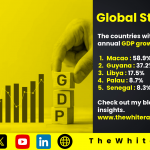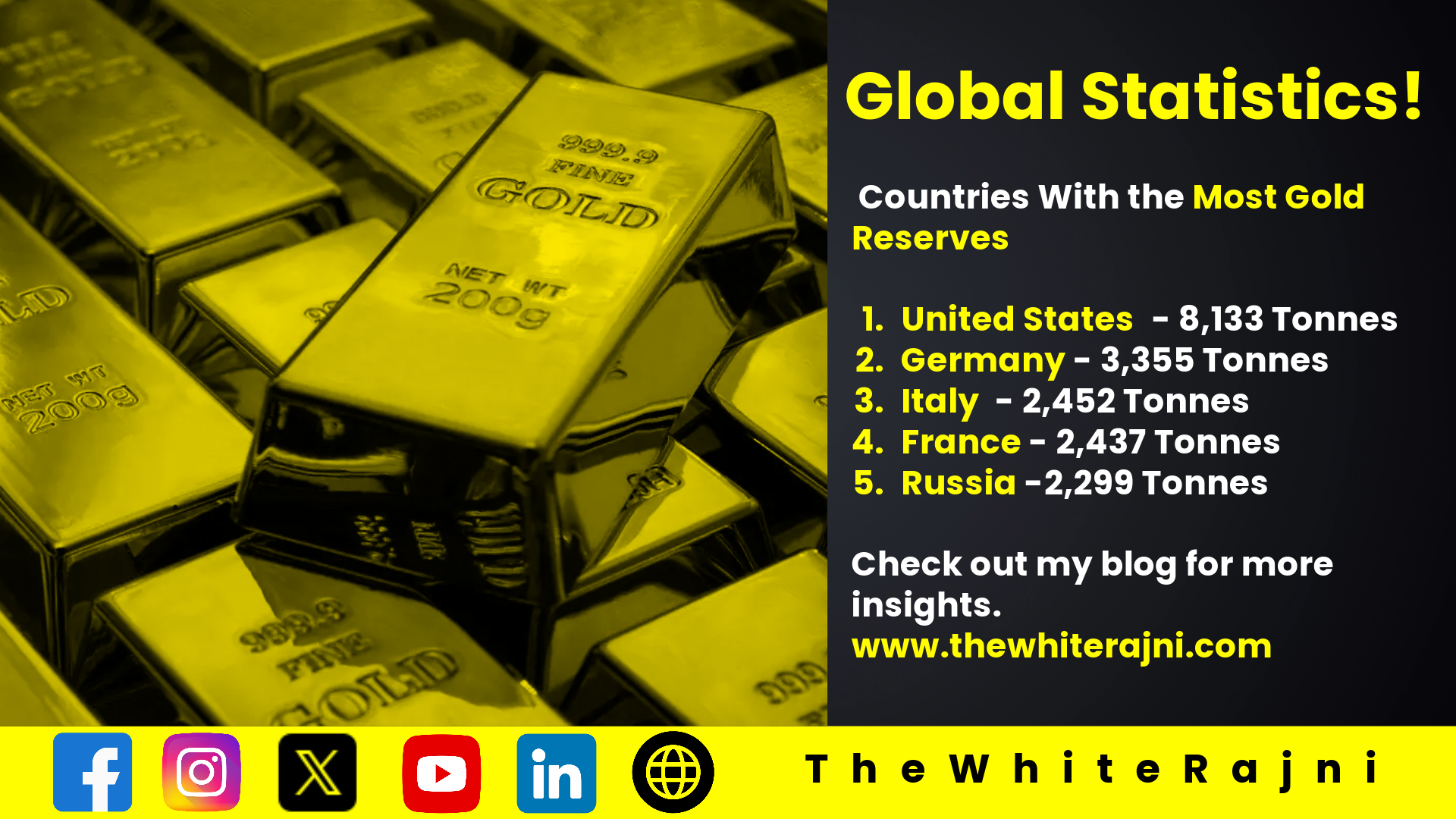Gold, a precious metal that has fascinated humanity for centuries, continues to hold a special place in the global economy. It’s not just a symbol of wealth and prosperity but also a strategic asset for nations. Governments worldwide maintain significant gold reserves as a safeguard against economic uncertainties and to fortify their financial portfolios.
The table below presents the top 50 countries with the most substantial gold reserves as of January 2023, based on data from the World Gold Council:
| Rank | Flag | Country | Gold Reserves (tonnes) |
|---|---|---|---|
| 1 | 🇺🇸 | United States | 8,133 |
| 2 | 🇩🇪 | Germany | 3,355 |
| 3 | 🇮🇹 | Italy | 2,452 |
| 4 | 🇫🇷 | France | 2,437 |
| 5 | 🇷🇺 | Russia | 2,299 |
| 6 | 🇨🇳 | China | 1,948 |
| 7 | 🇨🇭 | Switzerland | 1,040 |
| 8 | 🇯🇵 | Japan | 846 |
| 9 | 🇮🇳 | India | 785 |
| 10 | 🇳🇱 | Netherlands | 612 |
| 11 | 🇸🇦 | Saudi Arabia | 323 |
| 12 | 🇦🇹 | Austria | 280 |
| 13 | 🇧🇪 | Belgium | 229 |
| 14 | 🇲🇽 | Mexico | 197 |
| 15 | 🇨🇦 | Canada | 177 |
| 16 | 🇰🇷 | South Korea | 166 |
| 17 | 🇵🇹 | Portugal | 107 |
| 18 | 🇻🇪 | Venezuela | 100 |
| 19 | 🇰🇼 | Kuwait | 97 |
| 20 | 🇮🇩 | Indonesia | 93 |
| 21 | 🇪🇸 | Spain | 88 |
| 22 | 🇹🇭 | Thailand | 79 |
| 23 | 🇶🇦 | Qatar | 76 |
| 24 | 🇷🇴 | Romania | 67 |
| 25 | 🇲🇾 | Malaysia | 65 |
| 26 | 🇵🇱 | Poland | 62 |
| 27 | 🇦🇺 | Australia | 61 |
| 28 | 🇨🇿 | Czech Republic | 61 |
| 29 | 🇧🇩 | Bangladesh | 58 |
| 30 | 🇬🇧 | United Kingdom | 56 |
| 31 | 🇩🇿 | Algeria | 48 |
| 32 | 🇵🇪 | Peru | 44 |
| 33 | 🇨🇱 | Chile | 36 |
| 34 | 🇬🇷 | Greece | 35 |
| 35 | 🇨🇴 | Colombia | 34 |
| 36 | 🇺🇾 | Uruguay | 33 |
| 37 | 🇲🇦 | Morocco | 32 |
| 38 | 🇳🇬 | Nigeria | 32 |
| 39 | 🇦🇴 | Angola | 31 |
| 40 | 🇺🇿 | Uzbekistan | 30 |
| 41 | 🇩🇰 | Denmark | 28 |
| 42 | 🇸🇰 | Slovakia | 26 |
| 43 | 🇫🇮 | Finland | 24 |
| 44 | 🇷🇸 | Serbia | 23 |
| 45 | 🇪🇬 | Egypt | 22 |
| 46 | 🇮🇶 | Iraq | 22 |
| 47 | 🇸🇪 | Sweden | 20 |
| 48 | 🇳🇴 | Norway | 19 |
| 49 | 🇧🇾 | Belarus | 18 |
| 50 | 🇺🇦 | Ukraine | 17 |
At the top of the list is the United States, with an impressive 8,133 tonnes of gold reserves. Following closely are Germany, Italy, France, and Russia, making up the top five.
Notably, China is the sixth-largest holder of gold reserves, boasting more than 1,900 tonnes.
On the other end of the spectrum, countries like Denmark, Slovakia, Finland, Serbia, Egypt, Iraq, Sweden, Norway, Belarus, and Ukraine maintain reserves of less than 200 tonnes of gold.
The motivations behind countries accumulating gold reserves vary. Some nations do so to shield their economies from inflation and financial instability, while others aim to diversify their asset portfolios and reduce risk. For some, gold serves as a symbol of national sovereignty.
Regardless of the reasons, gold reserves stand as valuable assets for nations across the globe. They offer stability and security, especially during times of economic turbulence.










